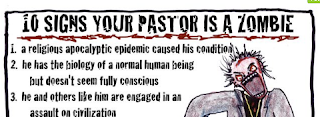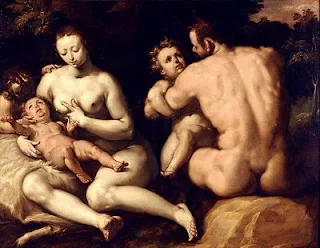The Most Difficult Forgiveness of All

Forgiveness is such a difficult topic to deal with and has so many complicated dynamics. Either it is almost an impossibility for people to grasp, or maybe it is so simple, we simply don't get it. It's probably both.
Religion is all about being forgiven.
God forgives humans through Jesus. Jesus forgives us if we ask. And of course, without the shedding of blood, there is NO forgiveness of sin, however why nor has always personally escaped me. What's so difficult about the Deity saying, "I forgive you." Enough with the blood already...
Most of the time we focus on either being forgiven by others, which has it's own dynamics, or trying to figure out how to forgive those that hurt or offended us. Everyone has both kinds forgiveness going on and so it can get complicated at times. We often are motivated by the idea of "well, I guess I have to forgive them because they said they forgave me...how dare them, damn it." Even the Bible encourages Christians to forgive simply because they were forgiven by God,through Jesus. It even says that God forgave us, not for our sake, but for Jesus sake, which seems a bit like missing the intended mark. I want to be forgiven for my sake for Jesus sake!
Frankly, most don't really forgive but rather let it go to a point of trying not to think about it and yet it simmers on the stove, always available to continue in some form of drama or painful memories to throw back and forth like lawn darts trying to hit the ring right in the middle and claim points over.
I have people in my life who I hope in time would forgive me and I have issues with some for which I need to keep growing toward a more complete and genuine forgiveness. I am at a stage where I am able to look back and see that sometimes what seems such an insult is really an opportunity to grow past something where things can work out better than it ever could have without the push. It is not always this way, of course, but can be if we look for the good in the "bad," which often lurks there grinning at us.
I'd like to talk a bit about the one kind of forgiveness that seems the most difficult of all. That would be forgiving YOURSELF. Forgiving yourself is something that is the final issue to be resolved when offenses have occurred for which forgiving or being forgiven has run it's course. We either can forgive others, and we do it over time and in degrees, or we can't. We are either forgiven, again over time and to various degrees, or we are not. We can control the pace of the one,
forgiving others, but not when, if or how others forgive us. That is their issue, not ours, even though we wish it could be given in such a ways as to feel genuine and perhaps open some new doors to reconciliation in any way.
But forgiving yourself feels almost impossible. Why? First of all, there is that funky part of our nature that feels our forgiving ourself is contingent on being forgiven FIRST by others for our offenses. Once they do that, then MAYBE, one can think of forgiving themselves. The problem is you might wait until hell freezes over before you are given permission of this kind to forgive yourself. If you forgive yourself without being forgiven by others, there tends to be a voice in your head that says, "How dare you forgive yourself. We have not forgiven you yet. What are you thinking!" It is followed by, "when we get around to forgiving you, we will let you know and then you can play at forgiving yourself, you jerk."
You see , forgiving oneself seems to others a some form of denial or that you don't take what has happened very seriously. To forgive yourself is to send a message that you are rather shallow or oblivious to the pain caused, when in fact, only you know that it is the depth of the pain that makes you want to be able to forgive yourself and move on. NO ONE can be harder on me than me. That is my own experience. I am the monkey on my own back when I cause pain to others. Perhaps others don't know this, believe this or even want to think this as it might take away some of the sting they can inflict if they choose to, but it is true. Most sensitive people, who even care about this topic are way ahead of their accusers in self condemnation and knowing the pain they have caused that they seek forgiveness for. There are flippant types who hurt others and seem oblivious to it. I do not speak of this type of person, nor is that who I am.
Secondly, as mentioned, we feel that if we forgive ourselves, even if there is no forgiveness extended to us, we are not taking the drama seriously enough. I felt and can feel guilty if not careful for even enjoying life as that might prove I don't take things seriously enough on this topic of forgiveness. "No I won't forgive you. You don't seem miserable enough yet." So often, being forgiven includes requirements and proof you are really sorry for the offense and prove it day and night, over and over by being miserable, practically forever...amen.
Sometimes the requirements that one must meet to be forgiven are just impossible to comply with. Sometimes there is a temptation to comply just to feel forgiven, but it won't last as the two really can't be connected.
Forgiveness is a clean experience that allows everyone to be who they really are and think as they really think, no apologies. Anything less is mere compliance for a time and then of course, on go the masks until the next time they fall off. Messy forgiveness is the obligatory kind usually enforced by a fear that if we don't, then Jesus or God or some Deity might just not forgive us of our picky little sins, that we really have very few of.
So in order to forgive ones self, one has to not connect the forgiveness with performance as proof. I can only speak for myself, and I am sure this would be a point of contention, but when I cause the need to be forgiven, I was doing the best I could at the time of the perceived problem. We always do our best at any particular moment which is different from doing better as others might wish us to do to come up to standards they feel are more correct, in their view. But doing better is a future thing. Doing our best is what we always do at any moment we do what we do, or we would do better!
Finally, it is hard to forgive ourselves because we tie being able to do that with fixing that which we are needing to be forgiven for. I am a fixer and caretaker by nature. That is how I am wired. ENFP according to Meyers and Briggs. That is Extrovert, Intuitive, Feeling and Perceptive. People like me become ministers, counselors, negotiators and of all things, massage therapists. So I have not strayed far from how I was wired at birth. We are negotiators because we tend to see both sides of all stories and the points that both sides make for their views. But the downside to this is that we can get stuck in views and not make decisions. If we can't fix it, we can't move on. If we can't fix it, then we don't mean it. If we can't fix it, then we are shallow and gutless. The fact is that some things just don't fix. That is painful but true. All things broken cannot be fixed and if forgiveness of the self is based on first fixing that which is broken, or different, or changed or one sided, then you can't forgive yourself and never will. And so you spin. Damned if you do and damned if you don't. Stuck between rocks and hard places, heaven and earth, the devil and the deep blue sea.
But, fixing is not a criteria for forgiving yourself. It can't be because we can't always fix that which is broken but we must forgive ourselves as a part of real living.
So examine how things came to be.
Know that you probably were doing the best you could under the circumstances at that time and that is not the same as doing better, but these are two different things.
Don't base your need to forgive yourself on whether anyone else on the planet forgives you for what you have done, not done or said you wished you could do.
Realize that, of course, you have taken this all very seriously. This might be proven by, oh say, the tears, the anxiety, the doubt, the head banging against the wall, the depression, which is anger turned inwards. It might be the shame you feel which is a perception that you have not lived up to tribal or religious expectations, as if most do, or the guilt over breaking the taboos of the group. Only you need to know how seriously you take that which happens in life and do not let your forgiving yourself depend on whether others give you permission to do so.
And finally, some things don't fix. Just getting back into some box that doesn't work is not a fix. Patching is not fixing and trying to be what others expect as the only way to fix is patching and masking. Often things don't fix because one is not accepted for what they are, how they think or what they believe. This is why many with marital problems separate for six months, return, separate for three months, return and then separate for one week , return for their socks and can't fix it.
Forgiveness is not something to take for granted, but a healthy life includes the ability to see through this topic in practical ways and forgive YOURSELF as well, and maybe even first of all.






